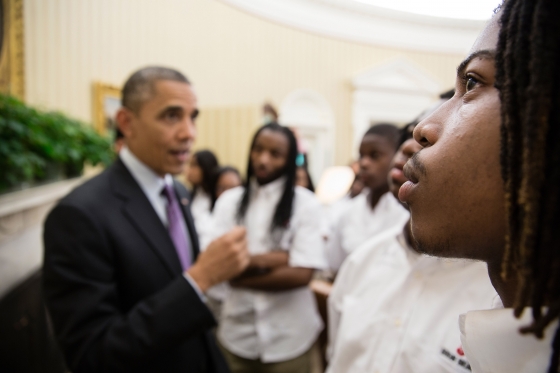My Brother’s Keeper: A New White House Initiative to Empower Boys and Young Men of Color
February 27, 2014
10:26 AM EDT
Today, from the East Room of the White House, President Obama will launch a new effort aimed at empowering boys and young men of color, a segment of our society which too often faces disproportionate challenges and obstacles to success. These obstacles are found in our schools, our communities, our criminal justice system, our families, and even in the minds of our young people themselves. The President is committed to build a broad coalition of backers to help break down barriers, clear pathways to opportunity, and reverse troubling trends which show too many of our boys and young men of color slipping through the cracks in our society.
To launch the “My Brother’s Keeper” initiative, the President will be joined by local and national leaders in philanthropy, business, government, faith communities, and media. The challenges facing boys and young men of color are broad and multidimensional, and so must be the team we bring to the table to begin fostering solutions.
On hand today will be General Colin Powell, Mayor Michael Bloomberg, Adam Silver, Congresswoman Marcia Fudge, Mayor Rahm Emanuel, Congressman Ruben Hinojosa, Magic Johnson, and many more leaders from key national and regional philanthropic foundations and major businesses, all of whom understand what is at stake with this effort. When we let this many boys and young men fall behind – we are crippling our ability to reach our full potential as a nation.
For decades, opportunity has disproportionately lagged behind for boys and young men of color – particularly in our African American and Latino communities. As recently as 2013, only 14 percent of black boys and 18 percent of Hispanic boys scored proficient or above on the 4th grade reading component of the National Assessment of Educational Progress compared to 42 percent of white boys and 21 percent of black and Hispanic girls. Youth who cannot read “proficiently” by third grade are four times less likely to graduate high school by 19.
By the time students have reached 9th grade, 42 percent of black male students have been suspended or expelled during their school years, compared to 14 percent of white male students. While black youth account for 16 percent of the youth population, they represent 28 percent of juvenile arrests, and 37 percent of the detained population. While just over 6 percent of the overall population, black males of all ages accounted for 43 percent of murder victims in 2011.
The fraction of young men not working or enrolled in school is nearly twice as high for blacks than whites. Those neither working nor in school are not building the skills and experience needed to ensure their ability to succeed later in life.
Across the country, communities are developing and implementing promising and proven approaches to help put our young people on paths to opportunity and success. Using intensive tutoring, the Becoming A Man program and the University of Chicago are demonstrating that dramatic improvements in math performance can be cost effectively made with middle school boys in Chicago.
The Miami public school system is serving thousands of students in dozens of schools with targeted interventions to lower dropout rates.
Restorative Justice programs used in Los Angeles contributed to a 38 percent reduction in suspensions, cutting black student suspensions in half.
In New York, the Young Men’s Initiative is validating the significant impacts the ASAP program is having on the college persistence rates of African American and Latino young men. These efforts are cause not only for hope, but for a renewed sense of urgency. As we learn more about what works, our resolve to act now must strengthen. This initiative is about building on successes and promising ideas in the field by testing, implementing, and scaling-up strategies which have been shown to have the greatest impact at key moments in these boys’ lives.
A New Presidential Task Force to Expand Opportunity.
President Obama will sign a Presidential Memorandum today, establishing the My Brother’s Keeper Task Force, an interagency effort, chaired by the Assistant to the President and Cabinet Secretary Broderick Johnson, that will help us determine what public and private efforts are working and how to expand upon them.
The Task Force will work across executive departments and agencies to:
- Assess and suggest improvements to Federal policies, regulations, and programs that apply to boys and young men of color.
- Create an Administration-wide “What Works” online portal to disseminate programs and practices that improve outcomes for boys and young men of color, while promoting incentives for private and public entities to develop and adopt strategies that have been proven to be effective.
- Develop a comprehensive public website, to be maintained by the Department of Education, that will assess, on an ongoing basis, critical indicators of life outcomes for boys and young men of color in absolute and relative terms.
- Recommend to the President means for ensuring this effort is sustained for years to come within government and across public and private sectors.
Key Investments by Leading Foundations and Businesses
The foundations supporting today’s call to action have already made extensive investments, including $150 million in current spending that they have already approved or awarded. Building on that, today these foundations are announcing that over the next five years they seek to invest at least $200 million, alongside additional investments from their peers in philanthropy and the business community, to find and rapidly spread solutions that have the highest potential for impact in key areas.
The foundations will work over the next 90 days to design a strategy and infrastructure for coordination of these investments, which can be aligned with additional commitments from a diverse array of actors from other sectors.
This is just the start of an effort that will continue to build over the coming months and years. When research clearly shows us a problem that needs fixing, it is our responsibility as leaders to band together to start implementing solutions. When we do – we will not only see better outcomes for boys and young men of color, we will see the entire country begin to fulfill its full potential.
Learn more about the My Brother's Keeper Initiative






